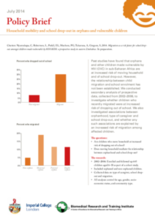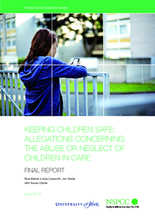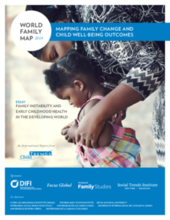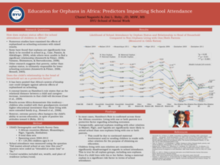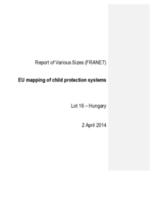Displaying 311 - 320 of 565
The questionnaire for children ages 0-9 years is intended for use as one of the OVC survey tools developed by MEASURE Evaluation, with support from the OVC technical working group of the U.S. President’s Emergency Plan for AIDS Relief (PEPFAR).
This policy brief provides an overview of research from 2002-2006 on whether children in Zimbabwe who recently migrated were at increased risk of dropping out of school, including research questions, findings, and conclusions.
The questionnaire for children ages 10-17 years is intended for use as one of the OVC survey tools developed by MEASURE Evaluation, with support from the OVC technical working group of the U.S. President’s Emergency Plan for AIDS Relief (PEPFAR).
The Child, Caregiver & Household Well-being Survey Tools for Orphans & Vulnerable Children Programs have been translated into French for use in francophone countries globally.
This study, from the National Society for the Prevention of Cruelty to Children (NSPCC) in the UK, focuses on those children in alternative care who experience abuse or neglect at the hands of their caretakers or guardians who are responsible for ensuring their wellbeing.
This study described the magnitude of physical abuse during childhood in a representative sample of young adults selected from public universities in Albania, and to identify relationship between socioeconomic characteristics and behavioural/lifestyle factors associated with adverse childhood experiences.
This presentation from Innocenti’s Expert Consultation on Family and Parenting Support discusses family separation, including the factors leading to it, global data on children’s living situations and how it relates to preventing separation.
The second annual edition of the World Family Map investigates how family characteristics affect children’s healthy development around the globe and includes a new essay focusing on union stability and early childhood health in developing countries.
This powerful chart illustrates preliminary research findings using data from Demographic and Health Surveys (DHS) in 5 African countries (Malawi, Mozambique, Niger, Uganda and Zimbabwe) to better understand how orphan status affects the school attendance of children in Africa and the extent to which living in kinship care can act as a protective factor in this context.
The European Union Agency for Fundamental Rights (FRA), at the request of the European Commission, conducted research on national child protection systems in the 28 European Union (EU) Member States. It seeks to understand how national child protection systems work and to identify common challenges and promising practices. This mapping is for Hungary.

